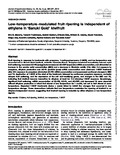| dc.description.abstract | Fruit ripening in response to treatments with propylene, 1-methycyclopropene (1-MCP), and low temperature was characterized in ‘Sanuki Gold’ kiwifruit,Actinidia chinensis Planch. Propylene treatment immediately induced rapid fruit softening, increased AC-PG (polygalacturonase) and AC-EXP (expansin) mRNA accumulation, and stimulated an
increase in the soluble solid concentration (SSC) and a decrease in titratable acidity (TA). After 3 d exposure to
propylene, ethylene production and AC-PL (pectate lyase) mRNA accumulation were observed. 1-MCP treatment
after 24 h exposure to propylene eliminated AC-PG mRNA accumulation and suppressed continued changes in SSC
and TA. Application of 1-MCP at the start of the treatment, followed by continuous propylene exposure, markedly
delayed fruit softening, and the expression of the cell wall-modifying genes, and changes in the SSC and TA,
indicating that kiwifruit become insensitive to ethylene at least for 3 d following 1-MCP exposure. Surprisingly,
significant fruit softening, mRNA accumulation of AC-PG,AC-PL, and AC-EXP, and decreased TA were observed
without ethylene production in intact fruit stored at low temperature for 1 month, but not in fruit stored at room
temperature. Repeated 1-MCP treatments (twice a week) failed to inhibit the changes that occurred in low
temperature storage. These observations indicate that low temperature modulates the ripening of kiwifruit in an
ethylene-independent manner, suggesting that kiwifruit ripening is inducible by either ethylene or low temperature
signals. | en_US |

